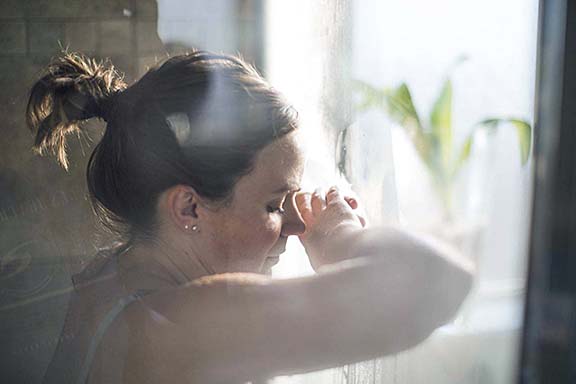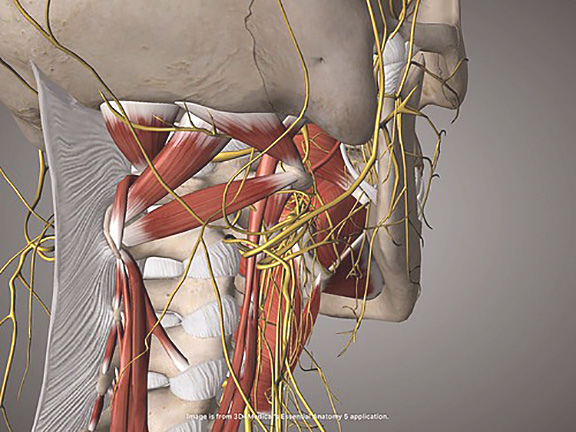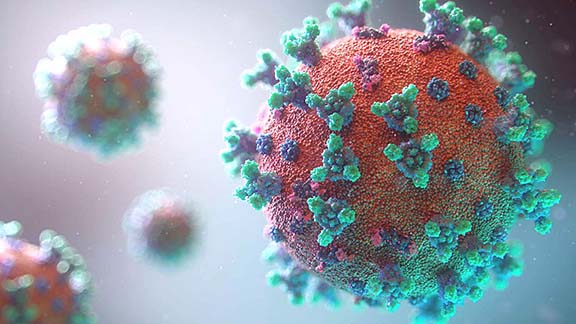The Long Haul
On December 20th, comedian D.L. Hughley posted, on Facebook, a November 20 Wall Street Journal article titled “Doctors Begin to Crack Covid’s Mysterious Long-Term Effects.” The WSJ article listed “severe fatigue, cognitive issues, and memory lapses, digestive problems, erratic heart rates, headaches, dizziness, fluctuating blood pressure, even hair loss” as COVID’s after-effects. The WSJ stated that some long haul COVID patients are trying dairy and gluten-free diets, and that physicians are investigating how coronavirus might affect the 10th cranial nerve, the vagus nerve.
The vagus nerve is part of the autonomic nervous system. The New College Latin & English Dictionary defines vagus as “wandering.” The vagus nerve extends, in myelinated and unmyelinated branches, from the brain to the colon automatically regulating our heart-lung function and digestion, while we wander through life.
On NPR’s, December 5 “Weekend Edition Saturday,” Scott Simon interviewed Lauren Stiles, president of Dysautonomia International. Ms. Stiles described another condition affecting long haul COVID patients: POTS. POTS, short for postural orthostatic tachycardia syndrome, affects the autonomic nervous system, which, as described by Ms. Stiles, “controls our heart rate, our blood pressure, our digestion, and many other automatic bodily functions… POTS can cause lightheadedness, shortness of breath, fatigue, headaches, GI motility problems.”
 I am not a doctor. I’m not diagnosing myself or anyone else here, but, as I listened to NPR’s segment about POTS, it occurred to me that POTS symptoms match many of my issues. The Cleveland Clinic website states “patients may develop POTS after a viral illness, serious infections, medical illness, pregnancy and trauma such as head injury. The condition may develop as the aftermath of a significant illness (especially associated with hospitalization and prolonged immobilization).”
I am not a doctor. I’m not diagnosing myself or anyone else here, but, as I listened to NPR’s segment about POTS, it occurred to me that POTS symptoms match many of my issues. The Cleveland Clinic website states “patients may develop POTS after a viral illness, serious infections, medical illness, pregnancy and trauma such as head injury. The condition may develop as the aftermath of a significant illness (especially associated with hospitalization and prolonged immobilization).”
I first heard of the vagus nerve when I read Peter A. Levine, Ph.D.’s, In an Unspoken Voice: How the Body Releases Trauma and Restores Goodness. I have since read much about dorsal vagal freeze response. In the early 1960s, on a public playground, I once told a playmate that she’d used a bad word after she’d muttered a racial epithet to describe some African American children playing nearby. She demanded I tell her what bad word she’d said. I told her. The nearby children heard me say the word. In an instant, the children turned toward us while my friend pointed at me and said, “she said it.” I felt paralyzed. I remember nothing.
My experience and reading suggest to me that our mind-body connections, including the 10th cranial nerve, manifest in much that is holistically, individually, and collectively known as “us.” How we engage with others and with our world reflects patterned neurological response. When threatened with unabated trauma and stress, we sometimes start to shut down. Illness is trauma. When we are immobilized for any reason, our nerves and neurons might just fire together preparing some sort of self-protective response or exit strategy. The fight/flight and freeze responses of post-traumatic stress disorder and dissociative disorder are just a couple of the mental health diagnoses applied to neurological injuries rooted in physical neurological response.
I worry about people on ventilators.
In addition to not being a doctor, I am also not a psychologist. I do I have a BA in Psychology, and I don’t remember hearing much about physical brain injury, nutrition, vagus function, or balanced exercise and stretching as factors linked to any of the mental illnesses that I read about in my vintage 1980’s edition of the American Psychiatric Association’s Diagnostic and Statistical Manual of Mental Disorders. Adverse Childhood Experiences including trauma are now known to contribute to poor overall body/mind health right on through adulthood. Yet, collectively, as a people, we are still a bit stingy in acknowledging that inadequate and defective nurturing for ourselves and others can and does lead to individual and shared health problems for everyone.
Leadership matters.
Both Mary Trump’s, Too Much and Never Enough and Bob Woodward’s, Rage provide insight into the dynamics behind the 45th president’s attitude during the early mounting numbers of COVID infections and death. (President Donald Trump stated that he didn’t realize COVID-19 was serious until one of his personal friends, whom the president described as a large man, died of COVID.) As I read both books, I felt empathy for Donald Trump. I needed to remind myself that he’s called on his supporters to “knock the crap out of” protesters at rallies.
 Our nervous systems respond to fist-pumping tough talk. Tough talk in crowds endangers us all. Toughness can’t kick the “crap” out of COVID. We can avoid COVID. We can learn how to stay healthier. More is being revealed all the time.
Our nervous systems respond to fist-pumping tough talk. Tough talk in crowds endangers us all. Toughness can’t kick the “crap” out of COVID. We can avoid COVID. We can learn how to stay healthier. More is being revealed all the time.
Happy New Year.











